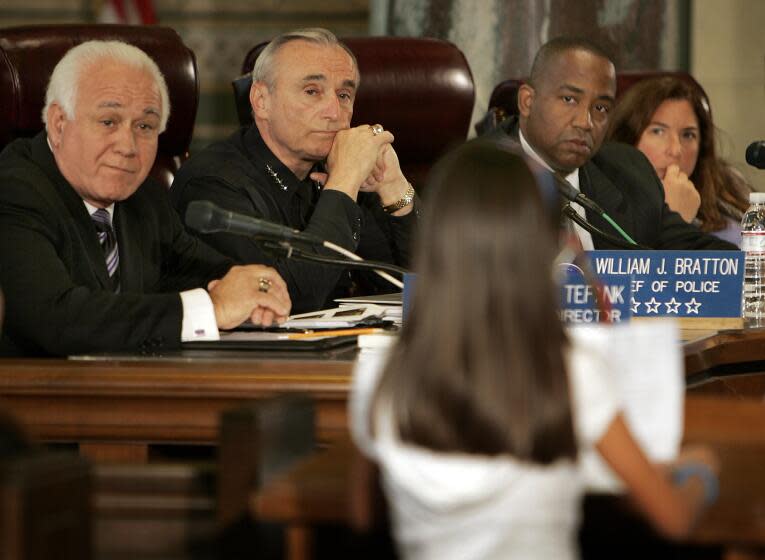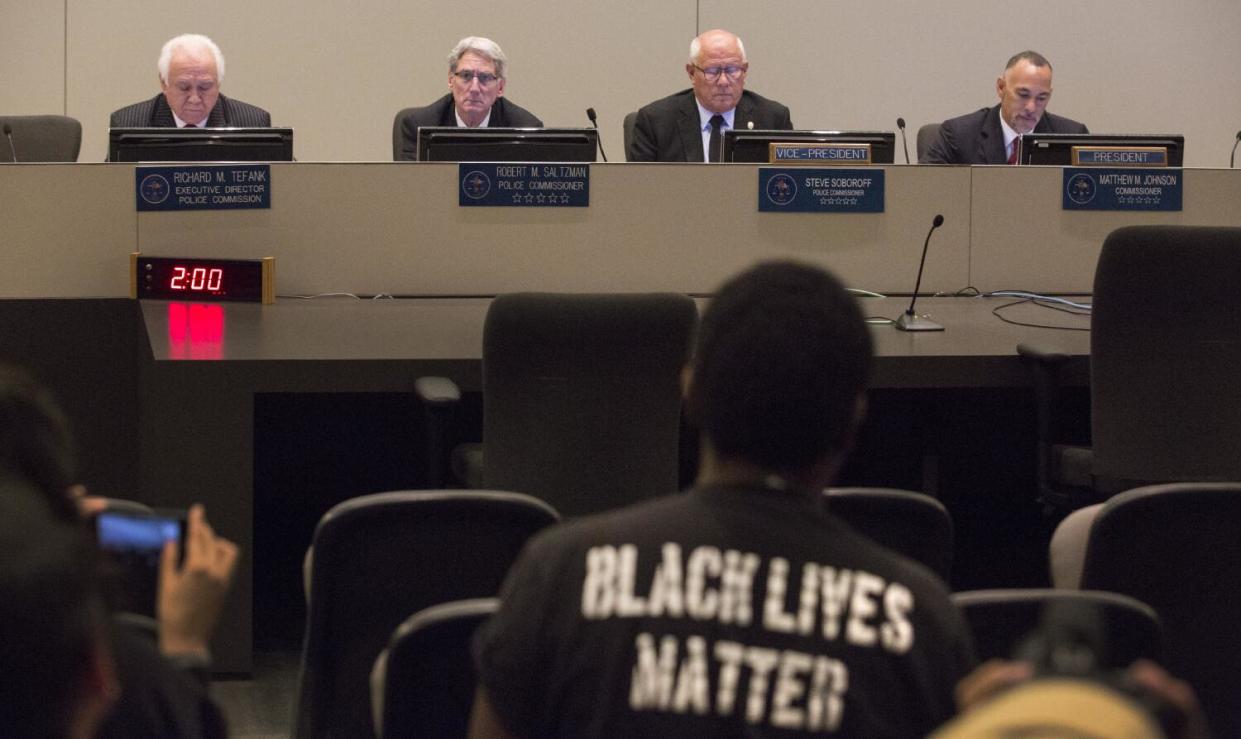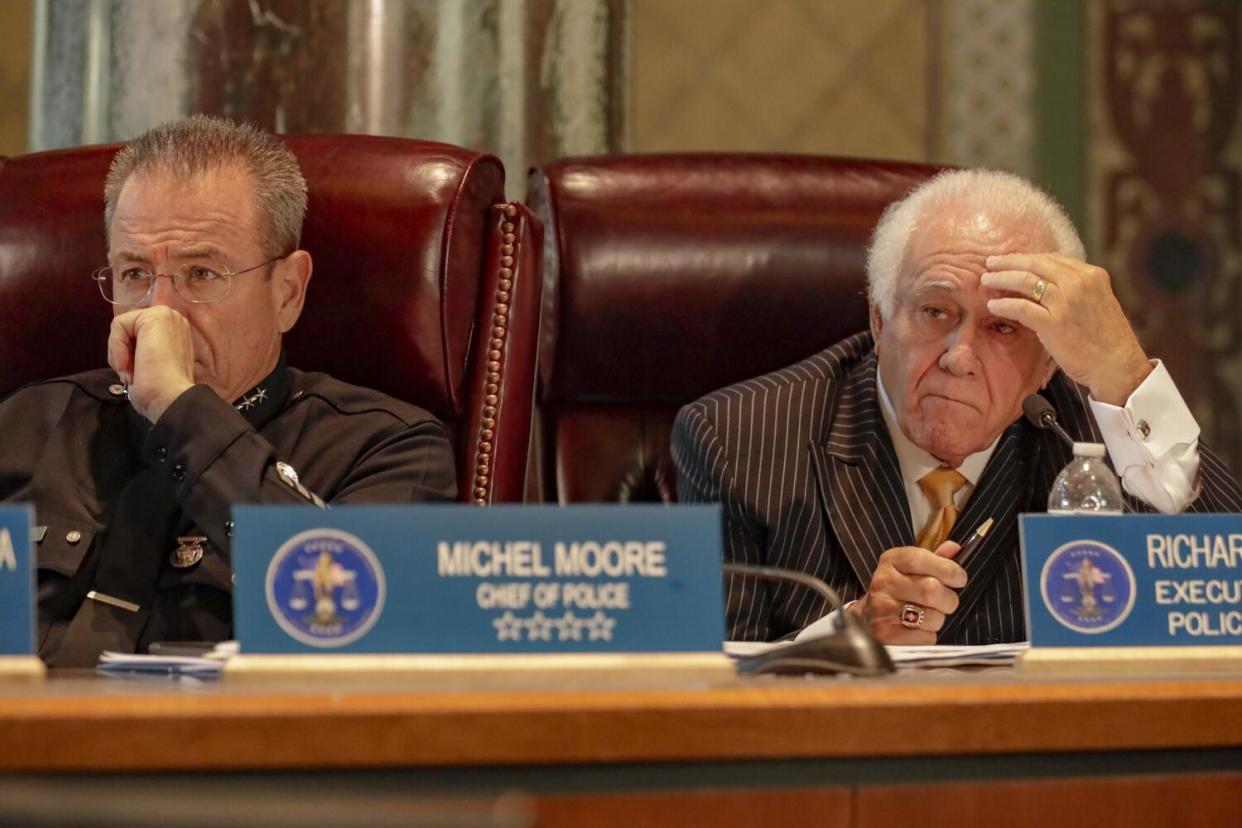'Never happened before': Key oversight officials leave as LAPD searches for chief

In the market for senior police officials, Los Angeles is hiring.
As of this week, the city faces an unprecedented three vacancies in key LAPD leadership and oversight positions: chief, inspector general and executive director of the Board of Police Commissioners.
The current inspector general, Mark Smith, was named Monday as an independent monitor to oversee police reforms in Portland, Ore. Another top oversight official, Richard Tefank, who served as executive director for the Board of Police Commissioners for nearly two decades, retired at the end of last month.
The department is already without a permanent police chief after Michel Moore unexpectedly announced his retirement in January after 5½ years as chief. Last month, the Police Commission appointed Assistant Chief Dominic Choi to take over on an interim basis. A Northern California headhunting firm was hired last month conduct a nationwide search for the city's next top cop, a process that is expected to last through August.
Read more:Who will be L.A.'s next police chief? City hires headhunter firm to lead search
The all-civilian Police Commission, which functions much like a board of directors for the department, will now be tasked with picking replacements for Tefank and Smith — while also selecting three police chief candidates for Mayor Karen Bass to consider.
The simultaneous openings mark a crossroads for civilian oversight in the city, where the commission has an opportunity "to place its stamp on the department going forward," said Gerald "Gerry" Chaleff, a past commission president.
"That's never happened before," said Chaleff, who helped negotiate the sweeping 2000 federal agreement imposed on the LAPD, largely because of the Rampart corruption scandal, in which gang officers planted false evidence, stole narcotics and shot people without justification.

If approved for his new role in Portland, Smith will work to settle a decade-old review by the U.S. Department of Justice, which previously accused the city’s police of engaging in a pattern of excessive force during arrests of people with mental illness.
It's unclear who will take over for Smith until a permanent replacement is named.
Read more:Top LAPD oversight official may leave one troubled police department for another
Tefank's temporary replacement is Django Sibley, an assistant inspector general who oversees all investigations of serious police uses of force and has built a reputation as an effective behind-the-scenes operator since joining the office in 2004.
A former small-town police chief who spent the past 20 years overseeing the commission — far longer than all of his predecessors in the role — Tefank was named the commission's director after having serving as top cop in the cities of Buena Park and Pomona. He was fired from the latter job over what he said was his refusal to remove officers because he felt doing so violated their due process rights.
Tefank started at a particularly challenging stage for the LAPD. Only 18 months prior, the long-troubled department had entered into a federal consent decree that forced scores of changes overseen by a monitor and a federal judge. For the next two decades, his earnest, raspy voice and wispy white hair were fixtures at commission meetings.
In an interview Monday, Tefank said he was proud of what he'd accomplished over a 55-year career in law enforcement. As executive director he said he had a front row seat to the post-Rampart transformation of the department, from one that had been historically fiercely opposed to outside influence to one that grudgingly embraced change.

Despite its continued challenges, including significant staffing shortages, Tefank says he thinks the department is headed in the right direction.
“I would hope my legacy is that I served the commissioners — all 28 of them that I worked for — well, I served the department well, and I served the public well, that I balanced all those three areas," he said.
Shortcomings in the oversight of the LAPD have been documented in countless official reports since the 1960s, and critics say the five-member Police Commission still lacks teeth. It can order policies changed and has the ability to recommend the firing of a police chief — or decide whether to bring one back for a second term — but it has next to no say in the department's day-to-day operations. The inspector general's office is responsible for conducting audits and studies, but only at the commission's request.
Read more:How getting ‘jacked up’ by police helped shape the LAPD’s chief watchdog
"The problem is that the police commission may be doing more ... but it still doesn't have the ultimate authority to make systemic changes," said Chaleff, the former commission president.
Each week, the commission's meetings at LAPD headquarters are filled with frustrated critics activists and residents who lament what they see as the oversight panel's unwillingness to stand up to the police department in meaningful ways.
Tefank pushed back on what he called "a false perception" about the commission's cozy relationship with the LAPD. He said that taking a more "adversarial role," as some critics would like, would make it harder to build support for new policies. “I challenged the department when I thought it was appropriate, and also quite frankly I challenged the commissioners when I thought it was appropriate," he said.
Former LAPD Chief William J. Bratton said that when he set out to remake the department on the heels of the Rampart scandal he found a willing partner in Tefank, whom he remembered for his expansive knowledge of policing, "very congenial" personality and work ethic.
"It's very important that the police chief get along with the Police Commission," Bratton said, "and in order to make that work you need an executive director who has the ability to build a bridge between the two."
By the time he retired, Tefank held considerable sway over the commission. As director, he set meeting agendas to clear the path for certain issues or projects. He was also responsible for choosing the hearing examiners who sit on the panels that decide whether officers should face discipline or termination. .
Read more:LAPD can’t get rid of their bad cops. Here’s what they want to do about it
Police Commission member William Briggs called Tefank one of the department's "unsung heroes." Briggs, said that, like himself, most commissioners don't come from law enforcement backgrounds and so relied on Tefank's institutional knowledge for advice in creating new policies or scuttling old ones.
"Mr. Tefank guided us and steered us, not only through a department that very few of have familiarity with," said Briggs, an entertainment lawyer. "He is our eyes and ears to what is happening in the department on a daily basis."
Briggs, who spoke prior to Smith's departure for Portland, said the recent vacancies have given the department and the city something of a clean slate.
"This is the start of a new chapter for law enforcement and the city of Los Angeles," he said, "one that would take us into the next century of policing."
This story originally appeared in Los Angeles Times.
